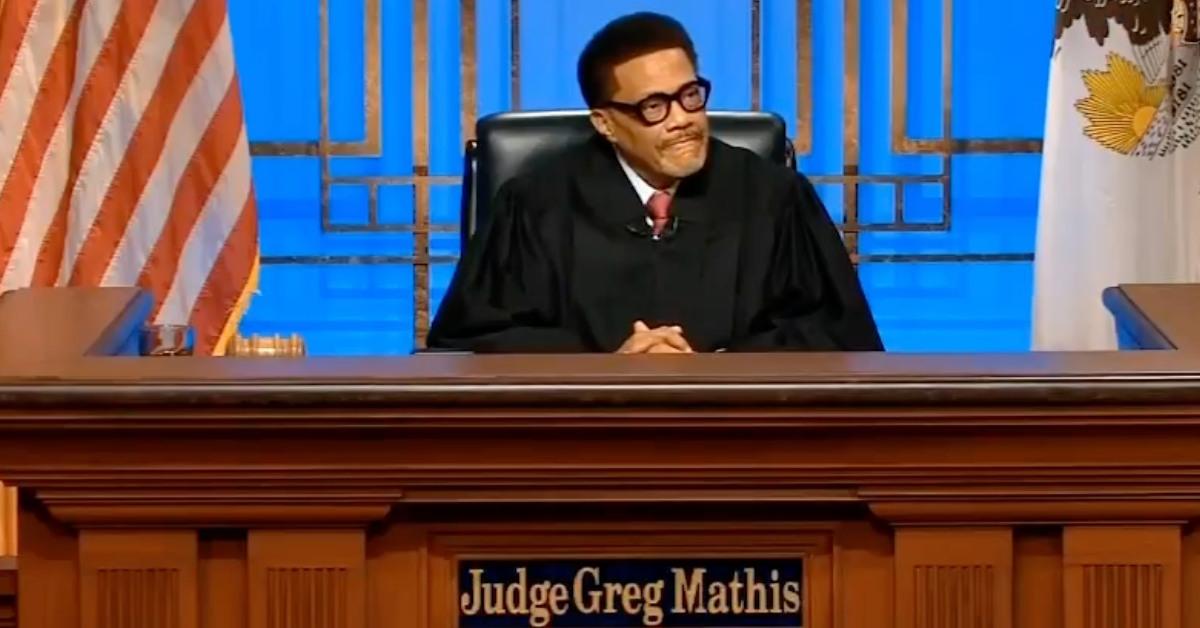Is Judge Mathis A Real Judge? Unpacking The Truth Behind The TV Courtroom
For many who've spent years watching courtroom dramas unfold on television, a common question often pops up: is that judge actually a real judge? It's a very fair question, really, especially with so many shows out there. You see, the line between entertainment and genuine legal proceedings can sometimes feel a bit blurry, can't it? People often wonder about the authenticity of the legal figures they invite into their living rooms each day.
And when it comes to long-running, popular shows, one name that frequently comes up in these conversations is Judge Mathis. His show was a fixture for a really long time, captivating audiences with its unique blend of legal disputes and his distinctive approach to justice. So, it's pretty natural for folks to ask: was he just playing a part, or did he truly hold the power of the gavel in a real court?
This article aims to clear up any confusion about Judge Greg Mathis, a figure known for his straightforward manner and, you know, his memorable rulings. We'll explore his background, his time on television, and, perhaps most importantly, provide a clear answer to that often-asked question: Is Judge Mathis a real judge? Let's get into it.
Table of Contents
- The Man Behind the Gavel: Who is Judge Mathis?
- Judge Mathis: Personal Details & Background
- A Career Beyond the Screen: Judge Mathis's Legal Roots
- Inside the Courtroom: How the Judge Mathis Show Worked
- Judge Mathis's Enduring Legacy
- Frequently Asked Questions About Judge Mathis
- Final Thoughts on Judge Mathis's Authenticity
The Man Behind the Gavel: Who is Judge Mathis?
Gregory Ellis Mathis, widely known as Judge Mathis, is a name that, you know, resonates with many people. He became a national figure, really, not just for his work on television but also for his strong voice advocating for urban youth and equal justice. His story, actually, is quite compelling, showcasing a journey from a challenging upbringing to becoming a very respected figure in the legal world and beyond.
He's a person who, in a way, embodies resilience. His inspirational life story of a street youth who made it big, well, it's pretty well-known. He's always been someone who seems to look for a positive solution, even for the most dire situations, which is a bit of a hallmark of his approach.
Judge Mathis has always, you know, had a public presence that goes beyond just the courtroom. He's known for his advocacy campaigns, tirelessly working for causes he believes in. This commitment to helping others, particularly young people, has really defined a significant part of his public identity, too.
Judge Mathis: Personal Details & Background
To get a fuller picture of Judge Mathis, it helps to look at some key details about his life and career. He's had a pretty interesting path, actually, from his early days to becoming a household name.
| Full Name | Gregory Ellis Mathis |
| Known As | Judge Mathis |
| Occupation | Retired Judge, Television Arbitrator |
| Notable Work | Judge Mathis (TV Show) |
| Judicial Role | District Court Judge for Michigan's 36th District (Retired) |
| TV Show Run | September 13, 1999 – May 25, 2023 (24 Seasons) |
His background is quite a story, you know, one of overcoming obstacles. He came from a challenging upbringing, starting out as a street youth, and then worked his way up. This personal experience, in a way, seems to have shaped his perspective and his dedication to issues like equal justice, which is pretty clear in his public work.
He's often described as someone who is "always a judge but never judgmental," which, you know, speaks volumes about his character. He really seems to focus on finding a positive way forward for people, even when they're facing tough times. This approach, you know, has made him a beloved figure for many years.
A Career Beyond the Screen: Judge Mathis's Legal Roots
So, let's get right to the heart of the matter: Is Judge Mathis a real judge? The answer is a resounding yes, he actually is. This is a pretty important distinction, especially when you compare him to some other television court show arbitrators who might not have the same judicial background. He wasn't just playing a role; he genuinely held a significant position in the legal system before his television career ever began.
Before he became a familiar face on our screens, Gregory Ellis Mathis was, in fact, a retired judge from Michigan's 36th District Court. He previously served as the district court judge for Michigan's 36th district, which is a very real and important judicial role. This means he exercised significant governmental power, just like any other judge, making decisions about questions of law and acting as a referee between parties during civil and legal proceedings.
Unlike some other TV personalities who might arbitrate disputes, Judge Mathis brought genuine judicial experience to his show. This background, you know, gives his on-screen presence a certain weight and authenticity. He wasn't just someone pretending to be a judge; he had already spent years in the actual legal system, making real judgments and understanding the intricacies of the law. This fact, you know, really sets him apart.
His experience included ruling on the admissibility of testimony and evidence, and, you know, making decisions about cases. This real-world experience, actually, is what allowed him to transition so smoothly into the role of a television court show arbitrator while maintaining that air of genuine authority. It's pretty cool to think about, really, how he went from a real courtroom to a television one, still applying his legal knowledge.
Inside the Courtroom: How the Judge Mathis Show Worked
The Judge Mathis show, which, you know, ran for a very long time, had a specific format and way of operating. It quickly gained popularity, apparently, due to its engaging setup and the judge himself. Understanding how the show worked helps to clarify the nature of the cases and the proceedings viewers saw.
Cases and Claims on the Show
The cases presented on Judge Mathis were classified as tort law civil disputes. These are, basically, disagreements between individuals, where one party claims the other caused them harm or loss. A typical amount for small claims court, the maximum claim on the show was $5,000. This is pretty standard for the kind of disputes often seen in real small claims courts, actually.
It's important to note that the producers of the show selected the cases. So, while the judge was real and the legal principles applied were genuine, the specific disputes seen on TV were, you know, curated for broadcast. This doesn't mean the outcomes were predetermined, but rather that the show's team found cases that would make for compelling television, which is pretty common for these kinds of programs.
The judge, in these televised cases, still made decisions about questions of law, just like he would in a traditional courtroom. He ruled on the admissibility of testimony and evidence, and, you know, acted as a referee between the parties involved. This structure allowed for a blend of real legal process with the entertainment format, making it quite engaging for viewers.
The Show's Longevity and Format
The Judge Mathis show had an incredibly long run, spanning 24 seasons. It aired from September 13, 1999, to May 25, 2023, which is a pretty impressive run for any television program, actually. Each episode typically ran for one hour and usually consisted of four cases, which kept the pace moving and viewers engaged.
The show was broadcast five days a week in every U.S. state, as well as in Canada through Omni Television. This wide reach meant that Judge Mathis became a very familiar face in homes across North America. The consistent schedule and format, you know, helped build a loyal viewership over the years.
For many, the hallmark of Judge Mathis was the judge himself. His personality and his unique way of handling disputes were, you know, central to the show's appeal. The show's format, with its focus on civil disputes, gave him ample opportunity to showcase his ability to find solutions and offer advice, which was pretty much what people tuned in for.
Compensation for Participants
A question that often comes up about television court shows is whether the people appearing on them get paid. For Judge Mathis, the answer is yes, people were given compensation. They received an appearance fee, which is a pretty standard practice for participants on these types of programs. This helps cover their time and travel, and, you know, encourages people to share their disputes on air.
This compensation, it's worth noting, is separate from any judgment made in the case. The show's structure ensures that participants are compensated for their presence, regardless of the outcome of their specific case. This is a pretty important detail for understanding how these shows operate, actually.
The show also featured a final bailiff, Doyle Devereux, who was a familiar face alongside Judge Mathis for many years. His presence, you know, added to the authenticity of the courtroom setting, making the proceedings feel more like a real legal environment, which is pretty cool when you think about it.
Judge Mathis's Enduring Legacy
Judge Mathis has left a pretty significant mark, you know, both on television and in the wider community. His approach to justice, characterized by being "always a judge but never judgmental," has resonated with many. He consistently sought to find a positive solution for the most difficult situations, which is a rather distinctive quality.
His commitment extends beyond the TV screen, as he remains a national figure known for his advocacy campaigns. He's a very vocal champion for urban youth and equal justice, using his platform to make a real difference. His inspirational life story, from a street youth to a respected judge, you know, serves as a powerful example for many.
Recently, Judge Mathis expressed pride in a decision involving his son, Amir, highlighting the qualities that made Amir an ideal candidate for a position. This shows, you know, a continued dedication to mentorship and upholding standards of justice, even within his own family. It's pretty clear that his values run deep.
The content of his show, in a way, was somehow autobiographic, since it was based on the life of a judge who solves disputes. This personal connection, you know, likely added another layer of authenticity and relatability for viewers. His life experiences, actually, really informed his judicial style, which is something many people appreciated.
Frequently Asked Questions About Judge Mathis
Is Judge Mathis a real judge?
Yes, Judge Mathis is a real judge. Gregory Ellis Mathis, widely known as Judge Mathis, is a retired judge from Michigan's 36th District Court. He held a significant position in the legal system before his television career began, actually serving as a district court judge. So, he was, in fact, a judge, which is pretty definitive.
Is Judge Mathis's show real?
The Judge Mathis show featured real disputes, though the producers selected the cases for broadcast. The cases were tort law civil disputes with a maximum $5,000 claim, typical for small claims court. While the judge himself was a real, retired judge making actual rulings based on legal principles, the show was, you know, produced for entertainment. People also received compensation in the form of an appearance fee, which is pretty standard for these types of programs.
Do people get paid to be on Judge Mathis?
Yes, people appearing on Judge Mathis were given compensation. They received an appearance fee for their participation on the show. This is a common practice for television court shows, ensuring that participants are compensated for their time and for bringing their cases to the televised courtroom, which is pretty straightforward.
Final Thoughts on Judge Mathis's Authenticity
So, to bring it all together, the answer to "Is Judge Mathis a real judge?" is, you know, absolutely yes. Gregory Ellis Mathis truly is a judge, and he held a very significant position in the legal system before he ever stepped into the television spotlight. He served as a district court judge for Michigan's 36th district, which means he had genuine experience making legal judgments and handling real-world cases. This fact really sets him apart from some other television personalities who might arbitrate disputes without a formal judicial background.
His show, which ran for an impressive 24 seasons until May 25, 2023, brought genuine civil disputes to the screen, with a real judge overseeing the proceedings. While the cases were selected by producers and participants received appearance fees, the legal principles applied and Judge Mathis's rulings were based on his extensive judicial experience. He consistently aimed to find positive solutions, reflecting his personal journey and advocacy for equal justice. You can, for instance, learn more about small claims court procedures on our site, or perhaps explore other legal topics that might interest you. His legacy, you know, is one of authenticity and a deep commitment to fairness, which is pretty clear to anyone who watched his show.

Is Judge Mathis a Real Judge, a Reality Star, or Both?

Is Judge Mathis a Real Judge, a Reality Star, or Both?

Is Judge Mathis a real judge? Net worth explored as iconic show's